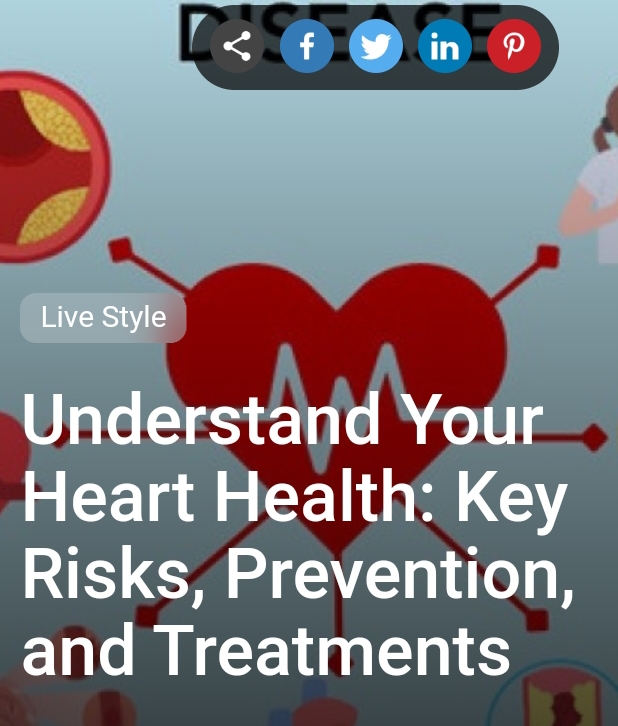Create original contents like this on www.jamiihuru.com get paid
Understanding your heart health is essential to living a longer, healthier life. This article highlights the key risks, prevention strategies, and treatment options for cardiovascular diseases. Learn about non-modifiable risks like age and genetics, and discover how lifestyle changes

Understand Your Heart Health: Key Risks, Prevention, and Treatments
Introduction to Heart Health Risks
Understand Your Heart Health is crucial if you want to live a longer and more active life. In the United States, over seven million adults over the age of 20 suffer from some form of heart disease. Shockingly, about 600,000 to 700,000 people experience a stroke every year. Heart and vascular diseases are leading causes of death for those aged 65 and older. These conditions involve problems like damaged heart valves, weak heart muscles, blood vessel issues, and circulation concerns. Vascular diseases, including blood clots and peripheral artery disease, also fall under this dangerous umbrella.
Know the Common Risk Factors
Heart and vascular diseases affect people across all genders, races, and ages. Some risks, unfortunately, cannot be changed. These non-modifiable risks include:
- Age
- Gender
- Ethnicity
- Family history
- Genetics
Studies show that men (8%) are at a slightly higher risk than women (6%). Moreover, African Americans and South Asian Americans experience heart disease at higher rates than other groups.
Manage Your Modifiable Risk Factors
Thankfully, several risk factors are within your control. Modifiable risks include:
- High blood pressure
- Diabetes
- Smoking
- Physical inactivity
- Obesity
- High cholesterol levels
By making positive lifestyle changes, you can significantly lower your chances of developing cardiovascular diseases. Activities like quitting smoking, maintaining a healthy weight, and staying physically active are excellent starting points.
Understanding Different Types of Chest Pain
Not All Chest Pain Is Heart Related
Many people associate chest pain directly with heart attacks. However, several other conditions can cause similar symptoms. According to Dr. Vincent D. Abbrescia, chest pain may also be a sign of:
- Ulcers
- Hiatal hernias
- Gallbladder issues
- GERD (acid reflux)
- Panic attacks
- Pneumonia
- Blood clots
If you experience chest pain, it is essential to seek medical advice. Mild symptoms can wait a day or two before consulting your doctor. However, for intense chest pain, an immediate trip to the emergency room is highly recommended.
Prevention: Your Best Weapon
Take Action Early
A proactive approach is the best way to manage heart health. Early detection and preventive care can save lives. Dr. Abbrescia explains that while many doctors treat diseases once they appear, the best healthcare providers focus on prevention.
Practical Steps for Prevention
Here are some smart steps you can take today:
- Avoid smoking: It damages blood vessels and increases heart disease risk.
- Exercise regularly: Aim for at least 30 minutes of moderate exercise most days.
- Control your weight: Obesity adds extra strain to your heart.
- Monitor cholesterol levels: High cholesterol can clog arteries.
- Manage diabetes effectively: Lower your A1C levels to reduce complications.
Diagnosis and Treatment Options
Heart disease diagnosis often involves a combination of medical history reviews, physical examinations, and specialized tests. Risk assessments help doctors determine the best strategies for each patient.
Collaborative Treatment Approach
Treating cardiovascular disease usually involves a team of healthcare professionals. Doctors, dietitians, imaging specialists, social workers, and family members all play important roles. Together, they support the patient’s journey toward better heart health.
Common treatments include:
- Medication to control blood pressure or cholesterol
- Educational programs about heart health
- Lifestyle modifications targeting diet and exercise
Conclusion: Take Charge of Your Heart Health
It is never too early to understand your heart health and take action. With the right knowledge, support, and commitment, you can prevent or manage cardiovascular diseases effectively. Be proactive, make healthy choices, and partner with your healthcare providers to safeguard your heart’s future.
Leave a Reply